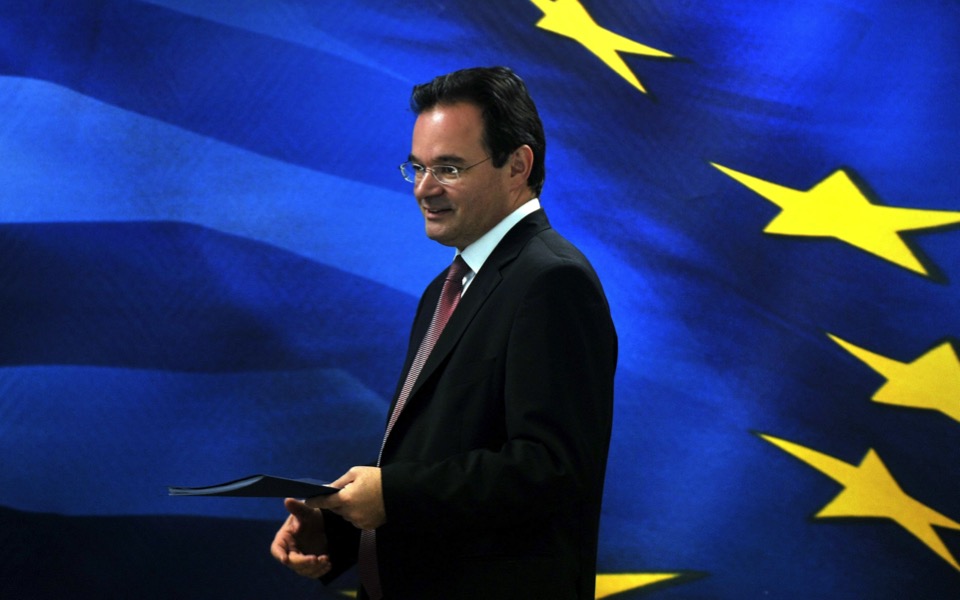Former finance minister casts light on roots of crisis

"Three memorandums, four elections, six prime ministers, nine finance ministers and one referendum later, we still have a long way to go."
[Giorgos Papaconstantinou]
There is a small detail – it does not immediately strike one as important next to other events – which sums up the essence of the six-year Greek crisis: Around late 2011, Greece often faced fears of fuel shortages. The reason was simple. No one was willing to sell to the Greek oil companies on credit, as the nation’s credibility had been seriously damaged. The country’s future at the time appeared to waver between bankruptcy and Grexit (perhaps it still does).
And yet, what were really nightmarish developments for the standards of a Western state and its citizens were never subjected to serious analysis by the majority of the domestic political system. Here we are not only talking about the country’s political parties, but also judicial officials, the media, university professors and intellectuals. In other words, a big chunk of the domestic elite which, despite their undeniable domestic responsibility for the ballooning debt and deficits, continued all that time to cultivate among the people all sorts of delusions and conspiratorial myths regarding the causes of the problem, and the solutions to it.
Here lies the value of “Game Over,” the new book by Giorgos Papaconstantinou, a former finance minister in George Papandreou’s government who will go down as one of the protagonists in the biggest crisis of the post-dictatorship era (Metapolitefsi). The book explores a large number of unknown details while outlining all the key moments of the crisis as it unfolded. Much of the book focuses on the watershed moment: what were the reasons of the near-default in 2010 and what was the process that saw the country sign up to the bailout deals.
With regard to the causes behind the crisis, it’s hard to question the views put forward in this volume. In 2009, the Papandreou government took over a state that – intentionally – failed to produce accurate statistical evidence. As a result, the 6 percent deficit reported by the second administration of Costas Karamanlis in 2009 was revised upward to 15.4 percent. A couple of statistics are enough to show exactly when the Greek deficit and debt skyrocketed: the five-year period from 2004 to 2009. In order to account for this, one need only look at the structural problems of the Greek state apparatus and the twisted relationship between the political system and Greek voters. Nothing new here.
Papaconstantinou is a profound Europeanist, but he nevertheless takes care to highlight the mistakes made by Greece’s partners. They were late, he says, in realizing the dangers. Then they constantly put off painful decisions to a later date. The biggest European power – Germany – was reluctant to lead efforts to tackle the problem, while putting much emphasis on the “ethical” aspect of the issue (“the lazy Greeks”). The author also points out tactical mistakes (such as the Deauville declaration on debt restructuring), while adding that the first memorandum was actually a punitive deal mainly aimed at appeasing the the creditors’ domestic audiences. On top of that, Papaconstantinou says, there were regular and serious arguments between the representatives of the troika on issues small and big (such as debt relief).
Even so, financial aid under the two first bailout loans totaled 240 billion euros. Never before had a Western state received a loan of such proportions. Did the Greek state back then really have any alternative to resorting to the European rescue mechanism? Absolutely not. One hopes that after the leftist-led government’s efforts to find alternative sources of financing (such as Russia) turned into a fiasco last year, even the most skeptical observers have been convinced that there really was no other option. After all, this was the only solution that would safeguard the country’s geopolitical position in the Western alliance (by no means a minor concern).
As the book suggests, the economic management of the problem was not the main problem. Despite the massive challenge of carrying out deficit cuts of an unprecedented scale and in an extremely short period of time, adjustment was taking place at a rather satisfactory level until 2011, thanks to the strong will of a small minority of officials, and the huge sacrifices of the many. The problem, rather, had to do with the political handling of the crisis. Blame cut across the political system. Rebels within the PASOK government at the time were undermining this difficult task while the stance of New Democracy and the other opposition parties – most importantly SYRIZA – can be summed up in one word: irresponsible.
The country had entered a new era where political power above all meant unpopular decisions and fewer benefits for those in power. This would become painfully evident to the following governments that would be elected on an anti-memorandum platform.
As European Commission President Jean-Claude Juncker put it, “We all know what to do, we just don’t know how to get re-elected after we’ve done it.”
The book allows for some key conclusions: First, the reasons behind a bankruptcy are virtually always domestic. Second, the European rescue path may not be the best path, but it is the best available. Third, it has once again been demonstrated that the European Union is moving ahead through crises, but it nevertheless moves ahead without coming apart. Fourth, when in difficulty Greece was assisted by the responsible stance of “evil” bankers such as Mario Draghi and Yannis Stournaras. Finally, the crisis ain’t over until Germany sings, and she remains a reluctant performer.
The book’s virtues don’t stop here. Despite the fact that Papaconstantinou was scapegoated and attacked over the so-called Falciani case (the case has gone to court so no further comment is necessary here) the ex-minister’s language remains mild even when he makes references to his foes, often with British wit and a penchant for self-criticism.
After six years dominated by heated and polarized rhetoric, the author’s moderate style is like music to our ears. It serves as a measure against which public commentators can express themselves.
* Dimitris Sotiropoulos is assistant professor of Contemporary Political History at the Technological Educational Institute of Peloponnese and chief editor at the Nea Estia literary journal.





